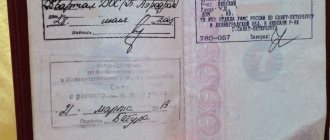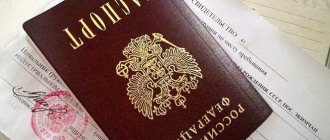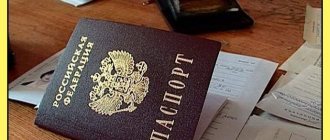Risks and consequences
A resident with a temporary registration acquires the same rights as any other person with a permanent registration, that is, he can:
- Live on the premises of the apartment;
- Register in the territory in which it is registered one’s own children who have not yet reached the age of majority, without the consent of the apartment owner or interested parties.
It is difficult to say whether there are risks for the owner regarding the fact that minor children may be registered in his home without his consent. However, according to the law:
- A child may be temporarily registered in the same territory as his parent for a longer period than the temporary resident himself. Because of this, after the parent’s temporary registration expires, he has every right to file a lawsuit in order to once again obtain registration at the registration address of his son or daughter. In this case, the consent of the homeowner is not required.
- The owner of the apartment can appeal the child’s registration through the court, which will be canceled if there is sufficient evidence.
To avoid such consequences, you should ask the person who will be registered in the apartment in advance whether he has small children. If a child is born to a temporarily registered person, guardianship or adoption occurs, then it is advisable for the owner to be personally present during the registration of the child and independently control the end dates of registration.
If you register a person in an apartment, what consequences might there be? What are the risks when registering a stranger? The owner bears certain risks when he registers a stranger in the residential premises. Among the risks and negative consequences are:
- the impossibility of discharging a stranger without a trial if he is against it;
- the emergence of the right to use living space and live in it;
- the ability for a stranger to register a child in the apartment, since no one’s consent is required.
As a result, by registering a stranger, you can end up with an unwanted tenant and litigation.
The registration of someone else does not give him the right to claim property, since it does not give anyone the right of owner.
In addition, if there are many people registered in the living space, they are not relatives of the owner and do not actually live there, criminal liability for providing fictitious registration is possible.
You can learn about the difference in the concepts of “registration” and “registration”, as well as how temporary registration differs from permanent registration on our website.
The rights acquired by a temporarily registered citizen are similar to the rights of residents with permanent residence registration:
- a temporary tenant acquires the right to stay and live in the apartment;
- This registration form allows you to register your minor children at your temporary address without obtaining the consent of the owner and other interested parties.
It is difficult to say unambiguously whether the temporary registration of a child has negative consequences for the owner of the premises. The consequences of temporary registration for the owner in this case are determined by the articles of the Housing Code of the Russian Federation, which exempt the parent from obtaining the consent of the owners and tenants of housing for the registration of a minor child:
- there is the possibility of a situation in which a citizen has the right to register a minor child with him for a period exceeding the period of his registration - this circumstance arises due to the inattention of FMS employees and the absence of regulations clearly regulating the period of registration of the child. For how long you can make a temporary registration, we tell you here. The result will be the presence of the following problem: the parent, after the expiration of his registration, has the right to be forced through the court to register again at the address of his child;
- temporary registration of a minor child, the consequences of which may be similar to the situation described above, will be appealed through the court and, if sufficient evidence is provided, canceled by a court decision, i.e. In special cases, a child can be discharged without the consent of the mother.
To avoid this situation, when moving in, it is necessary to obtain information about the presence of children of the registered citizen. At birth, adoption, or registration of guardianship of a minor child, it is advisable that the owner be personally present at the FMS office when submitting the application for registration, sign it personally and control the dates that end the period of temporary registration for the parents and the child.
Owner's obligations and risks
The owner of the apartment has practically unlimited rights to it. This right also includes providing one’s living space for registration to any person. (Chapter 5, Article 30, Clause 2 of the RF Housing Code).
The family ties of the owner of the apartment and the person wishing to register in it do not matter at all. Only one aspect is important - the consent of the owner.
The apartment can be divided between several owners, in which case the consent of each of them will be required. The accomplished fact of registration at the place of residence gives the registered person the full right to reside in this territory on an equal basis with the owners, and in such a situation it is very important to think about the consequences.
We discussed the question of whether it is possible to register in an apartment without the consent of the owner in this material, and you can find out whether the consent of other residents is really required for registration here.
When the owner of the property allows other people into the property for a period of more than three months, he must provide temporary registration for them. If citizens are not registered on its territory, then the owner of the apartment faces the following:
- If it is discovered that people living on its territory do not have temporary registration, then the owner faces a fine of up to 150,000 rubles, and also faces imprisonment for up to three years or correctional labor with restrictions on the ability to occupy certain positions.
- If the owner from whom the living space is rented does not want to register the tenants, they have the right to file a lawsuit to oblige the apartment owner to issue a temporary registration. However, if there is an agreement to rent an apartment, then it is possible to issue a temporary registration on its basis without the consent of the owner.
- The owner does not risk anything and does not bear any responsibility if the people living in his apartment are close relatives or have permanent residence in the same city.
We suggest you read: Salaries are withheld upon dismissal
Can an apartment owner sign out a registered relative?
- name of the judicial body (according to the structure);
- Full name of the plaintiff, contact details - similar information about the defendant (relative);
- information about the defendant’s residence in the owner’s apartment;
- requirement to discharge a family member;
- grounds for discharge;
- list of documents for the court;
- date and signature of the plaintiff.
To summarize, we can say that the owner of the apartment has every right to write out a registered relative. The legal grounds are clause 4 of Art. 31 LC RF and Art. 288 Civil Code of the Russian Federation. Registration can be canceled either by consent or through court. An important condition is the presence of compelling reasons for the discharge of a relative. The most difficult thing to remove from an apartment are minors, parents and spouses with a share in the property. The easiest way is to deregister your daughter-in-law, brothers/sisters and distant relatives.
We recommend reading: Find a new cadastral number using the old one
What risks are there for other residents?
Despite the fact that the law restricts the right of unauthorized persons to register without the consent of the owner of the territory, there are some exceptions. This means that a person has every right to register his minor children at his place of registration. Nobody can stop him from doing this.
And yet, living in peace between people who are strangers to each other on a common territory may be more difficult than it seems at first glance. Therefore, when giving consent to a stranger to register in your apartment, you need to understand what this means for you and that there may be no way back.
After all, everyone who is registered in an apartment has equal rights to live in it. It is not necessary to give your consent to the right of permanent residence of a stranger in your home, so registering a non-relative involves certain risks for the residents of the apartment. Find out more about what rights registration gives a person here.
Registration may have time restrictions. For the owner, this is a more profitable option, because it makes it possible to protect yourself from unexpected surprises.
You should not unconditionally believe in the decency of the tenant. It must be remembered that the activities of fraudsters often do not cause concern. And having registered in the apartment, the criminal has an arsenal of means to force the owner to rewrite the privatized apartment in his name.
Rent amount
The increase in the cost of utilities should not frighten those who have meters for water, electricity and gas. The price will increase only for what can be spent.
This means that the number of residents is multiplied by the tariff and the amount required to be paid is obtained. All this can be found out by looking at a regular receipt. At the same time, payments for heating, elevators, garbage chutes, housing maintenance and major repairs will remain the same, since they do not depend on the number of people living in a given area.
The only thing is, since one or more people will live in the apartment, the amount of light, water and gas consumed will increase, and subsequently the amount on the receipt will increase. If you do not want to pay for what your tenants “attacked,” then this point should be discussed and written down in the contract in advance.
Temporary registration and utility payments are a separate topic, important not only for the owner, but also for other citizens registered in the apartment.
The answer to the question whether the rent increases during temporary registration is determined only by the presence of water, electricity and gas meters in the apartment. In the absence of such, payment for housing is calculated in accordance with tariffs multiplied by the number of residents.
The receipt for payment of utility bills and rent contains comprehensive information about the tariffs and the purpose of each item required for payment. Sections such as payment for an elevator, garbage chute, heating, and utility repairs depend on the number of square meters in the housing area and are not tied to the number of residents. In these payment items, the question of whether the number of people registered affects the rent has a negative answer.
For apartments with meters, the remaining expense items directly indicate the values shown by the metering devices, and also do not depend on the number of residents in the apartment.
That is, for housing equipped with meters, the number of registered ones does not matter. Another thing is that when another citizen lives, the consumption of water, electricity and gas will inevitably increase, which will affect the amount of utility bills. Therefore, when temporarily registering a citizen, it is necessary to discuss this issue and fix the procedure and amount for him to pay his part of the utility bills.
How to register a cohabitant without the right to housing | Khabarovsk
Who told you that, roommate? During temporary registration, you can register with the Central Prison Center and obtain a license.
Law of the Russian Federation dated April 19, 1991 N 1032-1 (as amended on December 28, 2016) “On employment in the Russian Federation”
Article 3. Procedure and conditions for recognizing citizens as unemployed
2. The decision to recognize a citizen registered for the purpose of searching for a suitable job as unemployed is made by the employment service authorities at the citizen’s place of residence
no later than 11 days from the date of presentation to the employment service authorities of a passport, work book or documents replacing them, documents certifying his qualifications, a certificate of average earnings for the last three months at the last place of work, and for first-time job seekers (who have not previously worked), without qualifications - passport and document on education and (or) qualifications.
Law of the Russian Federation dated March 11, 1992 N 2487-1 (as amended on July 3, 2016) “On private detective and security activities in the Russian Federation”
Article 11.1. Legal status of a private security guard
The following persons are not entitled to apply for the legal status of a private security guard:
1) who are not citizens of the Russian Federation;
2) under eighteen years of age;
3) recognized by a court decision as incompetent or partially capable;
4) who have not submitted a medical report confirming the absence of medical contraindications to performing the duties of a private security guard;
(Clause 4 as amended by Federal Law dated July 13, 2015 N 230-FZ)
(see text in the previous edition)
5) having a criminal record for committing an intentional crime;
6) who have been charged with committing a crime (until the issue of their guilt is resolved in the manner prescribed by law);
7) who have not completed professional training to work as a private security guard;
(Clause 7 as amended by Federal Law dated July 2, 2013 N 185-FZ)
(see text in the previous edition)
 in respect of which, based on the results of an inspection carried out by the internal affairs body and (or) the federal security service in accordance with the legislation of the Russian Federation, there is a conclusion about the impossibility of admission to private security activities due to the increased danger of violation of the rights and freedoms of citizens, the emergence of a threat to public security, prepared in the manner established by the Government of the Russian Federation, and approved by authorized officials of the federal executive body authorized in the field of private security activities;
in respect of which, based on the results of an inspection carried out by the internal affairs body and (or) the federal security service in accordance with the legislation of the Russian Federation, there is a conclusion about the impossibility of admission to private security activities due to the increased danger of violation of the rights and freedoms of citizens, the emergence of a threat to public security, prepared in the manner established by the Government of the Russian Federation, and approved by authorized officials of the federal executive body authorized in the field of private security activities;
(Clause 8 as amended by Federal Law dated July 3, 2016 N 227-FZ)
(see text in the previous edition)
9) those who prematurely terminated their powers in a public position or were dismissed from public service, including from law enforcement agencies, prosecutors, judicial authorities, on grounds that, in accordance with the legislation of the Russian Federation, are associated with the commission of a disciplinary offense, gross or systematic violation of discipline, committing an offense that discredits the honor of a civil servant, loss of confidence in him, if less than three years have passed after such early termination of powers or such dismissal;
(Clause 9 introduced by Federal Law dated December 22, 2008 N 272-FZ)
10) whose private security guard’s certificate was canceled on the grounds specified in paragraph 1 of part four of this article, if less than a year has passed since the decision on cancellation was made;
(Clause 10 introduced by Federal Law dated December 22, 2008 N 272-FZ)
11) who have not passed the mandatory state fingerprint registration in the manner established by the legislation of the Russian Federation;
(Clause 11 introduced by Federal Law dated December 22, 2008 N 272-FZ)
12) repeatedly brought to administrative responsibility within one year for committing administrative offenses against the management order, administrative offenses encroaching on institutions of state power or public order and public safety, or administrative offenses in the field of trafficking in narcotic drugs, psychotropic substances, their analogues or precursors , plants containing narcotic drugs or psychotropic substances or their precursors, or their parts containing narcotic drugs or psychotropic substances or their precursors, with the exception of administrative offenses related to the consumption of narcotic drugs or psychotropic substances without a doctor’s prescription - before the end of the period, in during which a person is considered subject to administrative punishment;
(Clause 12 introduced by Federal Law dated June 23, 2014 N 158-FZ)
13) subjected to administrative punishment for the consumption of narcotic drugs or psychotropic substances without a doctor’s prescription - until the end of the period during which the person is considered subject to administrative punishment.
(Clause 13 introduced by Federal Law dated June 23, 2014 N 158-FZ)
Where do you register?
To register, you must visit the passport office or the nearest branch of the Federal Migration Service. The presence of the person wishing to obtain registration and the owner of the residential premises is required (in what cases and how it is possible to register a person without his presence, read here).
If there are several owners, everyone must appear. Each participant in this procedure must fill out an application in Form No. 6. A person in need of registration writes a statement about his desire to leave his previous place and register for registration at a new address.
The owners state that they have no complaints regarding the registration of the new tenant.
Important! If there is more than one owner of the property, but all individuals cannot appear at the Federal Migration Service, then a power of attorney is drawn up in advance for one of the owners, which must be officially certified by a notary office.
Required application items:
- The first thing you need to indicate is the name of the body to which the application is addressed.
- Information about the apartment in which the citizen is registered.
- Personal signatures of both parties to the contract (the one who registers and the owner of the property).
We invite you to read: How to obtain guardianship over an elderly person in the Republic of Belarus
Is it possible to register a stranger, not a relative, into the apartment? What are the risks and consequences
You should also be aware of the sanctions that may be applied if, for some reason, you have not legally designated your place of new stay and permanent residence within the prescribed period. Article 19.15.1 of the Code of Administrative Offenses will tell you about the sanctions (also read our article about the penalties for not having a child’s registration).
Where to submit documents? Documents are submitted to the FMS office for foreigners, and to the passport office for residents of our country. In exchange for the papers, they must issue an appropriate certificate proving the fact that the coveted registration will be received in the near future.
Resolution of controversial situations
Almost all controversial situations that arise when resolving housing issues are resolved in court. The owner has full right to dispose of the apartment and has the right to register and discharge residents from it at his own discretion at any time. Forced discharge of temporary residents before the end of their term is also carried out through the court.
When determining what the owner faces with temporary registration, the practice of litigation on housing legislation does not provide critical examples indicating that the owner of a property has lost his rights in whole or in part due to the registration of temporary residents in his property.
The main appeals to the court on issues of temporary registration:
- refusal of voluntary eviction;
- antisocial behavior of temporary residents or refusal to pay rent;
- registration of temporary registration without the consent of the owner or failure to indicate the final date of registration.
The reasons listed last in this list are possible when filing an application by mail or electronically. In all other cases, the presence of the owner is mandatory and he has the right to control the completion of a satisfactory temporary registration period specified in the application for a certificate of registration at the place of residence.
If you still have questions about the dangers of temporary registration for the owner, then ask them in the comments
List of required documentation for filing an application
Does registration affect ownership and what does it give? After registration, no matter whether in a private home or a municipal one, a person has the right (if he is registered in the apartment but not the owner):
- residence on the territory;
- use of apartment and common property provided to him;
- obtaining SNILS, TIN;
- registration of individual entrepreneurs;
- receiving subsidies and benefits;
- placement of the child in an educational institution;
- getting a job (if there is a registration restriction);
- registering your minor children and close relatives in an apartment;
- give consent to the registration of other people.
The list turned out to be not so small, but in essence it becomes clear that the registration has nothing more than a notification property. Does registration give you the right to own a home?
Ownership can only arise from the acquisition of housing - be it by purchase, inheritance, life annuity agreement, as a gift or by court decision.
Find out on our website who can be registered in housing purchased with a mortgage.
The situation is approximately (but not quite) the same with the municipal fund...
Documents from those wishing to register:- application in the form prescribed by law;
- identification document (passport or birth certificate if the applicant is a minor);
- a male person additionally presents a military ID.
- From home owners:
- passports of each of them;
- written consent of each person for the registration of this citizen;
- documents for the apartment.
As mentioned above, an application with the collected documents is submitted to the FMS office. To confirm that the documents have been submitted, the applicant is provided with a certificate confirming that he is awaiting registration.
general information
Who has the right to register someone in an apartment?
Only the owner or officially registered person.
Whatever the quality of the living space - private or municipal.
In the first case, both the sovereign owner of all square meters and the co-owner can register. True, there is one thing here - you will have to obtain the consent of all co-owners.
If the request for registration is addressed not to the owner, but to the official tenant, then again, it cannot be done without the consent of the co-owners.
Are there cases when you can get by “one person at a time”? Legally yes. You can count on this:
- minor children;
- immediate relatives (spouse, parents, adult children) - upon written request;
- co-owner of part of the share
You can find out whether consent from the owner is required for registration from our article.
What are the rules for registering in an apartment? Documents required for registration:
- application in form 6;
- identity cards of everyone involved in the transaction;
- certificate of ownership (or social tenancy agreement, warrant);
- arrival slip;
- documentary consent of co-owners and residents (if we are talking about municipal housing);
- marriage certificate;
- military ID;
- a copy of the personal account and an extract from the house register (for municipal housing).
After this, you will have to wait about a week, after which the resident will either have a stamp in their passport stating that they are permanently registered at the specified address, or will be issued a certificate of temporary registration. Information about residents is entered into the house register.
What are the rights of those registered in the apartment who are not the owners? You can find out what rights a person registered in a privatized apartment has in our article.
Registration concept and features
Registration involves registering a person in a specific place where he plans to live for a relatively long time. According to Russian legislation, every citizen must be registered, which makes it possible to keep records of people in relation to emigration and migration.
There are two types of registration - permanent - indefinite and temporary - for a period of 3 months to 5 years (for a foreign citizen, the maximum period of temporary registration is 3 years).
Temporary registration allows a person to legally reside in a specific place. Upon expiration of the period, the citizen must move out or renew registration.
When it is impossible to evict a resident from yours, even if he is not registered
The presence of registration does not imply the emergence of rights to housing - the tenant cannot apply for an apartment, rent it out, donate it, etc. Temporary registration allows you to live in the specified living space, but obliges you to move out or renew it after the expiration date.
Registration procedure
How can you register a person in an apartment? The process of obtaining registration raises many questions. The speed of obtaining a result directly depends on the correct sequence of actions, and the probability of receiving a denial of registration directly depends on the correct presentation of documents.
The start of registration depends on the type of property in which the person is registering.
If this is privatized real estate, then the consent of the owner is sufficient to begin with, since it is he who decides who is registered and who is not.
If there are several, then everyone must give approval.
It will be impossible to register anyone without the consent of at least one of the owners. If we are talking about municipal housing, then you need to start by obtaining permission from the landlord, tenant and other persons registered in it.
Where to register a person in an apartment? In almost any locality or regional center there is a branch of the Main Directorate for Migration Issues of the Ministry of Internal Affairs of Russia.
We suggest you read: Vacation on weekends is it legal?
It is this body that is called upon to resolve all issues related to migration, registration, its issuance or withdrawal.
You can go there directly to register. This is the fastest way to get results.
Where else can I go? There are other places you can go to regarding this issue. They are designed to speed up the procedure by unloading the Main Department of Internal Affairs of the Ministry of Internal Affairs of the Russian Federation.
The law stipulates the waiting period for registration after submitting an application, and it is no more than a week. In practice, migration officials are forced to extend this period. The reason for this is the need to request in other regions any information about the applicant.
Demanding payment for the provision of this type of service is illegal. The law does not provide for any type of payment for registration at the place of residence.
If you found out how much such a procedure costs, then you should know - several years in prison for a bribe. This action is completely free.
Opportunity to become an owner
Is registration a right to property? What can a registered person claim? Of course, this rule is not without its “buts”. A person registered in public housing can become not only a tenant, but also a co-owner.
Provided that he had never privatized anything in his life before. Then, when the apartment is privatized, he will become a co-owner on completely legal grounds (RF Law No. 1541-1, as amended in 2021). Just like his child, if he previously registered him there.
This is exactly the moment that you should especially think about when you are asked to temporarily shelter a distant relative who has come to work. It would be useful to be concerned about the presence of close relatives, especially minor offspring.
You can find out about the situation with registration in a communal apartment on our website.
Legal advice on registration of relatives
Please advise how to resolve the current situation regarding payment for gas and cold water supply. I am the owner of a private house. My family consists of three people. Throughout my stay in this house, I regularly pay the bills for three people. But the fact is that about five years ago I helped distant relatives with registration so that they could get a job. Since they do not live on my territory, but rent an apartment, I am responsible for them. I didn’t pay for the services. Now I am installing meters to record water and gas consumption. A technician came to me with an inventory. And when checking the house register, I identified “extra” people. Now I face paying for these people for five years plus an exorbitant fine. What do i do? Will you really have to pay for unused resources? After all, people haven’t lived even a day on my territory, and therefore haven’t used anything. Neighbors can confirm this. Thank you in advance for your response. Lyudmila.
We recommend reading: Find out the debt for housing and communal services via the Internet at the address Veliky Novgorod
The student is studying at the school. Are they required to register him in the school dormitory if he lives with relatives? The school where the student is studying has a dormitory. The student does not live there, but lives with relatives, but demands to register him, but was refused
The difference between an owner and a tenant
What is the difference between the rights of an owner and a registered person?
A registered person can perform actions, so to speak, of a notification nature - to receive all those civil benefits and opportunities that registration in his area provides, such as: enrolling a child in a kindergarten or school, receiving subsidies, Taxpayer Identification Number, obtaining an insurance certificate.
He can also register his young child for living space without asking anyone (Article 20 of the Civil Code).
But that's not all. The owner may (in addition to the above):
- register and deregister citizens of the Russian Federation regardless of the degree of relationship (Articles 31 and 35 of the Housing Code);
- sell living space, donate it, transfer it by inheritance, make it the subject of collateral, arrange redevelopment of the apartment (Article 30 of the Housing Code).
If we talk about who has more advantages, then it becomes obvious that the owner - if we are talking about private property, since only he, and not the tenant, is its sovereign manager.
Another thing is municipal square meters. Here the owner of the housing is the state, and all official residents have equal rights with each other. And for any legal action with the apartment, everyone’s consent is required.
The person registered may even give up his share during privatization. True, such a gesture of generosity still does not deprive him of his rights - the citizen will have the right to live in the living space until the end of his days.
However, it is still impossible to say that the owner is the king and God. For example, even after the registration period has expired, he cannot take and put annoying guests out into the entrance or, as is often done, throw their things from the balcony. Eviction and forced deregistration are the exclusive prerogative of the court.
Owner
If the property was acquired during marriage, then it is joint property. And it doesn’t matter who exactly the property is registered to. Accordingly, each owner has the right to use residential premises, regardless of the fact of registration. Therefore, the right arises not only when confirming the status of a family member, but also the owner himself.
The court was considering a case regarding the eviction of an ex-wife from an apartment, the share of which belonged to her husband as a result of the privatization process. But the court ruled that the share was joint, since the property was privatized during the period of official marriage.
The court did not accept the argument that privatization is a gratuitous transaction, therefore, the share in the apartment received as a result of privatization is the personal property of the spouse. The position of the highest authority is this: privatization is not a transaction, but an act of an authority on the provision of real estate into private ownership.
Therefore, any housing privatized during an official marriage is automatically recognized as joint property and is divided equally upon divorce.
If you do not live on site
What rights do a person who is registered but does not live have? The same as for the living tenant.
Currently, in the legislation of the Russian Federation there is no concept of “registration without the right of residence”
It is very easy to register, despite the seemingly large list of documents. Deregistration will be more difficult, especially for the apartment owner.
This, of course, is not a reason to isolate yourself from relatives and loved ones - this is a reason to seriously think and discuss the situation before starting any transactions.
If you find an error, please highlight a piece of text and press Ctrl Enter.









